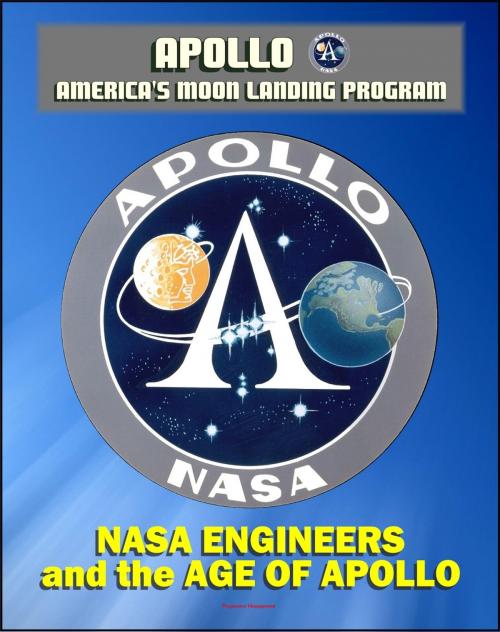Apollo and America's Moon Landing Program: NASA Engineers and the Age of Apollo - Stories of the Engineers Who Made the Moon Landing Possible (NASA SP-4104)
Nonfiction, Science & Nature, Science, Physics, Astronomy, Other Sciences, History| Author: | Progressive Management | ISBN: | 9781465896582 |
| Publisher: | Progressive Management | Publication: | January 14, 2012 |
| Imprint: | Smashwords Edition | Language: | English |
| Author: | Progressive Management |
| ISBN: | 9781465896582 |
| Publisher: | Progressive Management |
| Publication: | January 14, 2012 |
| Imprint: | Smashwords Edition |
| Language: | English |
This comprehensive official NASA history document - converted for accurate flowing-text e-book format reproduction - is a fascinating collection of interviews with engineers involved with the NASA space program and the Apollo moon landing project.
From the Preface: "A generation of men and women who had defined their lives to a large extent in terms of this nation's epochal departure from Earth's surface was taking its leave of the program they had built. Would they, or their work, be remembered? Would anyone care? As the historian for the National Aeronautics and Space Administration, I had the responsibility of attempting-attempting, because the task could never be fully done-to capture the essence of their lives and careers. Those who worked "on the front lines" of what I have called, after William James, a "moral equivalent of war," have had their quirks and genius memorialized in the agency's lore. If our memory of the Apollo era neglected those ordinary people, that memory would be incomplete, and we would have done an injustice to the true nature of life over time. Thus, the lives and careers laid out on the pages that follow have been drawn from hours of conversation with a variety of people: they are my best approximation of the "average" NASA engineer of the Apollo age; some did remarkable things, while others just filled in the pieces. It soon became apparent, however, that even the most "average" of them were part of a story that was larger than the Apollo story itself, much less NASA's story. What happened to them over the course of their careers was part of the undertow of what happened to this country during the post-World War II era and the 1960s."
This profile is thus necessarily restricted to those engineers who, for whatever reason, preferred to work for NASA. Fifty-one engineers from NASA Headquarters and its seven principal installations 12 were selected for interviews at random from each of four groups: the "nominee" group and the three cohorts that comprised the "total population" of engineers who came to work for NASA between 1958 and 1970. None declined what was most often received as an opportunity to tell one's own story and thus surface from the depths of anonymity to which bureaucracy consigns most of its workers. The interviews clearly suggested that the career experiences of the "nominee" group were substantially similar to those of the "total population" other than what I have noted above, which is indicated by a fairly straightforward demographic analysis.
The chapters that follow do not necessarily incorporate the observations or reflections of every person interviewed on every single subject. Predictably, some engineers told good stories and others had few stories that they could or wanted to tell. Some simply had more interesting lives than others. Those whose comments were selected for inclusion were chosen because the experiences they related were relatively typical-that is, other engineers could have told of similar experiences. Occasionally an engineer's observations were selected precisely because they were atypical; in those instances the reader is alerted to the exceptional nature of what follows. All of the engineers we asked to interview not only agreed to talk with us, but were as open about their experiences as their apparent individual levels of personal reticence seemed to allow. Although none requested anonymity, pseudonyms have been used throughout the text that follows (however, actual place names are used).
This comprehensive official NASA history document - converted for accurate flowing-text e-book format reproduction - is a fascinating collection of interviews with engineers involved with the NASA space program and the Apollo moon landing project.
From the Preface: "A generation of men and women who had defined their lives to a large extent in terms of this nation's epochal departure from Earth's surface was taking its leave of the program they had built. Would they, or their work, be remembered? Would anyone care? As the historian for the National Aeronautics and Space Administration, I had the responsibility of attempting-attempting, because the task could never be fully done-to capture the essence of their lives and careers. Those who worked "on the front lines" of what I have called, after William James, a "moral equivalent of war," have had their quirks and genius memorialized in the agency's lore. If our memory of the Apollo era neglected those ordinary people, that memory would be incomplete, and we would have done an injustice to the true nature of life over time. Thus, the lives and careers laid out on the pages that follow have been drawn from hours of conversation with a variety of people: they are my best approximation of the "average" NASA engineer of the Apollo age; some did remarkable things, while others just filled in the pieces. It soon became apparent, however, that even the most "average" of them were part of a story that was larger than the Apollo story itself, much less NASA's story. What happened to them over the course of their careers was part of the undertow of what happened to this country during the post-World War II era and the 1960s."
This profile is thus necessarily restricted to those engineers who, for whatever reason, preferred to work for NASA. Fifty-one engineers from NASA Headquarters and its seven principal installations 12 were selected for interviews at random from each of four groups: the "nominee" group and the three cohorts that comprised the "total population" of engineers who came to work for NASA between 1958 and 1970. None declined what was most often received as an opportunity to tell one's own story and thus surface from the depths of anonymity to which bureaucracy consigns most of its workers. The interviews clearly suggested that the career experiences of the "nominee" group were substantially similar to those of the "total population" other than what I have noted above, which is indicated by a fairly straightforward demographic analysis.
The chapters that follow do not necessarily incorporate the observations or reflections of every person interviewed on every single subject. Predictably, some engineers told good stories and others had few stories that they could or wanted to tell. Some simply had more interesting lives than others. Those whose comments were selected for inclusion were chosen because the experiences they related were relatively typical-that is, other engineers could have told of similar experiences. Occasionally an engineer's observations were selected precisely because they were atypical; in those instances the reader is alerted to the exceptional nature of what follows. All of the engineers we asked to interview not only agreed to talk with us, but were as open about their experiences as their apparent individual levels of personal reticence seemed to allow. Although none requested anonymity, pseudonyms have been used throughout the text that follows (however, actual place names are used).















